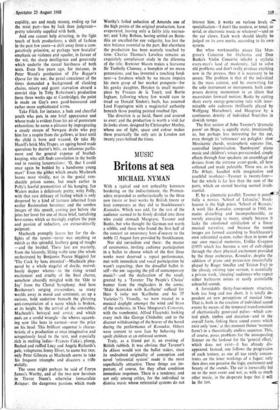Britons at sea
MUSIC
MICHAEL NYMAN
With a typical and not unhealthy keenness bordering on the indiscriminate, the Promen- aders responded as enthusiastically to the three new (more or less) works by British (more or less) composers as they did to Stockhausen's Kontakte. Which was odd, for the rest of the audience seemed to be firmly divided into those who could stomach Musgrave, Tavener and Banks, but who thought the German not worth a nibble, and those who found the first half of the concert an unsavoury hors d'oeuvre to the noble 12 August fare provided by Stockhausen.
Nor did surrealism end there: the master of ceremonies, inviting audience participation in a ballot to choose which of the first three works most deserved a repeat performance, met with immediate and vocal participation he wasn't expecting; then the dreadful ballot it- self—the Bac sugaring the pill of contemporary music?—and the declaration of the result, greeted by a 'Tavener The People's Choice' banner from the ringleaders in the arena; 'Make Kontakte with Karlheinz' sufficed for Herr S (why not 'Karlheinz and his 57 Varieties'?). Visually, we were treated to a musical dogfight amongst the wind and brass of the orchestra, in Thea Musgrave's Concerto, with the trombonist, Alfred Flasynski, looking every inch like George Chisholm; and to the discreet withdrawings of the braver of the bored during the performance of Kontakte. Others were content to save face by behaving like spoilt children at an enforced sermon.
Truly, as a friend put it, an evening of British rubbish. It was obvious that Tavener's In Athol: would win the ballot stakes, since its undoubted originality of conception and novel 'referential system' made it the most superficially attractive. These things are im- portant, of course, for they often condition immediate responses. There is a tendency, and not only among critics, for the individual to dismiss music whose referential systems do not
interest him; it works on various levels or specialisation—'I don't like modern, or tonal, or serial, or electronic music or whatever'—and so - the ear closes. Each work should ideally be judged on its own merits, according to its own system.
But when workmanlike pieces like Mus- grave's Concerto for Orchestra and Don Banks's Violin Concerto inhabit a stylistic. every-man's land of modernity, fail to solve old problems and don't really produce anything new in the process, then it is necessary to be severe. The problem is that of the individual in the mass context, and by overwriting for the solo instrument or instruments, both com- posers destroy momentum in an idiom that necessitates forward motion; Banks by cutting short every energy-generating tutti with inter- minable solo cadenzas (brilliantly played by Wolfgang Marschner), and Musgrave by a continuous density of individual flourishes in slowish tempo.
The first section of John Tavener's 'dramatic poem' on Hope, is equally static, intentionally so, but perhaps less interesting for the ear, even though its 'references' are polyglot: slow Messiaenic chords, stratospheric soprano line, controlled improvisation, 'flamboyant' piano music and children's voices pre-recorded, simple
effects through four speakers: an assemblage of devices from the extreme avant-garde, all here
softened and made palatable. These are, as in
The Whale, handled with imagination and youthful insolence—Tavener is twenty-four—
but the whole is far less than the sum of the parts, which on second hearing seemed insub- stantial. If, by a cinematic parallel, Tavener is potedll" Bally a novice, 'School of Lelouche,' Stock- hausen is the high priest, 'School of Resnais.'
A work like Kontakte, composed in 1960, re- mains disturbing and incomprehensible, or merely annoying to many, simply because it lacks the emotional satisfaction of a linear musical narrative, and because the sound images are formed according to Stockhausen's
own referential system, rather than in terms of
our own musical memories. Unlike Gruppen (1957) which has become a sort of cult-object through the sheer physical excitement provided by the three orchestras, Kontakte, despite the addition of piano and percussion (masterfully played by Roger Smalley and Tristan Fry) to the already existing tape version, is essentially a private work, 'cheating' audiences who expect either bathroom noises or easily assimilable colourful sounds.
A formidable thirty-four-minute structure, both too long and too short, it is totally de- pendent on new perceptions of musical time.
That is, both in the creation of individual sound events by means of the temporal transformation of electronically generated pulses—which con- trol pitch, timbre and duration—and in the overall form, linking these sound events which exist only 'now,' at this moment (hence 'moment form') in a theoretically endless sequence. This, of course, poses problems for the unsuspecting listener on the lookout for the 'general effect,' which does not exist—it has already dis- appeared. Instead, one follows the progression
of each texture, as one all too rarely concen- trates on the inner workings of a fugue; only then does one perceive the logic, excitement and beauty of the sounds. The ear is inexorably led on to the next event and not, as with so much other music, in the desperate hope that it will be the last.


































 Previous page
Previous page